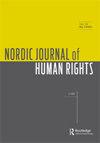The Lightness of Human Rights in World Heritage: A Critical View of Rights-Based Approaches, Vernaculars, and Action Opportunities
IF 1.2
Q3 POLITICAL SCIENCE
引用次数: 0
Abstract
ABSTRACT Why are the global rights commitments made by States Parties to the World Heritage Convention failing to trigger effective responses to critical human rights infringements? This paper responds to a continuous call from heritage practitioners to help clarify the meaning and significance of human rights-based approaches (RBA) that are adopted as policy imperatives, yet simultaneously undermined in practice. The first part of the paper reviews the vernacularization of human rights discourse and objectives at UNESCO and in the World Heritage policy field. It is argued that while clear formal commitments to human rights exist in the language, much ambiguity and several dilemmas remain in the framing of connections between heritage and human rights. The second part offers a critical discussion of the institutional traps, dilemmas and unresolved questions involved in adopting RBA in heritage work. A set of key questions follow about the why, what, for whom, and when, as well as how and under what conditions, human rights matter in heritage processes. While structural constraints appear daunting, accepting that heritage processes are powerful leads to real choices about whether to cement inequalities and state or corporate power hegemonies, or, conversely, to contribute towards building more equitable relationships.世界遗产中人权的轻量化:基于权利的方法、语言和行动机会的批判观点
为什么《世界遗产公约》缔约国作出的全球权利承诺未能引发对严重侵犯人权行为的有效回应?本文回应了遗产从业者的持续呼吁,以帮助澄清基于人权的方法(RBA)的含义和重要性,这些方法被作为政策要求而采用,但同时在实践中受到破坏。本文的第一部分回顾了联合国教科文组织和世界遗产政策领域的人权话语和目标的白话化。有人认为,虽然语言中有明确的对人权的正式承诺,但在确定遗产与人权之间的联系时,仍然存在许多含糊不清和若干难题。第二部分对在遗产工作中采用RBA所涉及的制度陷阱、困境和未解决的问题进行了批判性的讨论。接下来的一系列关键问题是,人权在遗产进程中为什么、什么、为谁、什么时候、如何以及在什么条件下发挥作用。尽管结构性约束看起来令人生畏,但接受遗产进程的强大会带来真正的选择:是巩固不平等和国家或企业的权力霸权,还是相反,为建立更公平的关系做出贡献。
本文章由计算机程序翻译,如有差异,请以英文原文为准。
求助全文
约1分钟内获得全文
求助全文
来源期刊

Nordic Journal of Human Rights
POLITICAL SCIENCE-
CiteScore
1.00
自引率
25.00%
发文量
29
期刊介绍:
The Nordic Journal of Human Rights is the Nordic countries’ leading forum for analyses, debate and information about human rights. The Journal’s aim is to provide a cutting-edge forum for international academic critique and analysis in the field of human rights. The Journal takes a broad view of human rights, and wishes to publish high quality and cross-disciplinary analyses and comments on the past, current and future status of human rights for profound collective reflection. It was first issued in 1982 and is published by the Norwegian Centre for Human Rights at the University of Oslo in collaboration with Nordic research centres for human rights.
 求助内容:
求助内容: 应助结果提醒方式:
应助结果提醒方式:


